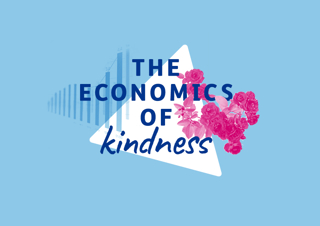
Dr Saite Lu, Mead Fellow and Director of Studies in Economics at Emmanuel College, Cambridge explores how economic thinking has changed through time and why it’s important to refocus on kindness.
Modern economics can trace its roots to Adam Smith's seminal work, 'The Wealth of Nations'. In his time, economics was primarily regarded as a moral science. Regrettably, contemporary interpretations of Smith's legacy have become somewhat constrained.
Economics textbooks have been dominated by concepts such as self-interest, optimisation, and market efficiency, while other essential behavioural traits like kindness, compassion, and trust are largely absent from the scope of economics. These elements, which Adam Smith detailed in his other seminal work, 'The Theory of Moral Sentiments,' are instrumental in understanding daily human interactions.
"Economics has been shifting from its foundational objective – studying human welfare."
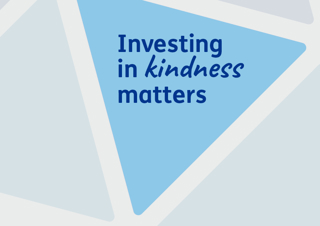
Nobel laureate Angus Deaton has recently been critical of the way economics has been shifting from its foundational objective – studying human welfare. He advocates for a principled re-evaluation to mitigate potential pitfalls in the future and encourages economic thinking to re-focus on helping improve people’s lives.
Kindness in economics matters. It is instrumental in forging networks and institutions with favourable impacts for corporate financial performance and societal well-being. Layard and Ward (2021) highlight that it is well-being that we ought to boost in society. Having profit as the sole target will inevitably lead us astray.
Kindness as a catalyst for positive organisational impact
Kindness is crucial in promoting the formation of networks and institutions with positive outcomes. In today's fiercely competitive job market, attracting and retaining talent remains a formidable challenge. Companies that embed kindness into their corporate culture not only attract the most talented employees but also the like-minded ones.
"Companies that embed kindness into their corporate culture not only attract the most talented employees but also the like-minded ones."

Notable successes like Patagonia substantiate this perspective. Its human resources department champions a "let them go surfing" motto, reflecting the company's flexible work schedule. This flexibility, combined with healthcare benefits and on-site childcare, further improves work-life balance and the overall well-being of its staff (Chouinard, 2005).
When staff members feel cherished, supported, and integrated into a community, their sense of belonging to the company strengthens. This sense of belonging reduces turnover, diminishing the costs linked to recruitment and training. Furthermore, content and committed teams amplify productivity and elevate the chances of success.
Empathetic, respectful, and equitable leadership invigorates and inspires employees and generates trust within the institution. A conducive workplace culture fosters collaboration and innovation, translating into enhanced productivity. The recent experiment with a four-day workweek supports these assertions, revealing not only reduced leave rates but also increased revenues, presumably due to enhanced productivity.
From mere profit to kindness-driven success
Friedman (1970) famously argued that ‘the business of business is business’. In his view, it is the government that needs to take care of social and environmental goals and set the rules for sustainable development.
Yet, in the modern landscape, the definition of corporate success extends beyond mere profit generation. While financial incentives remain pivotal, embracing kindness into the business strategy and operation has become essential in ensuring its sustainability in the long run.
Organisations are gradually moving away from success defined by shareholder value alone to reflecting success defined by a broader spectrum of stakeholders, encapsulated by the triple bottom line: people, planet, profit. There is a noticeable change in prioritisation, from placing financial gains at the forefront to addressing societal and environmental challenges first. Traditional business models, influenced by ideas like Friedman's, focus on short-term financial returns, often driven by periodic reporting. To ensure their long-term viability, businesses must shift their emphasis towards integrated value and sustained value creation.
"Embracing kindness into the business strategy and operation has become essential in ensuring its sustainability in the long run."
Professor Yunus's Grameen Bank and the subsequent microfinance revolution illustrate that business triumph isn't solely tethered to monetary returns. Yunus (2007) further elaborates his conception of social business — a model that prioritises societal and environmental outcomes while maintaining financial sustainability.
Modern consumers, especially younger cohorts, are gravitating towards businesses that resonate with their personal values. Sustainability-focused companies will benefit from increased customer stickiness and brand loyalty. Companies committed to sustainability and social responsibility are often better positioned to adapt to regulatory shifts and market dynamics in the long term.
Investors are also increasingly aligning their strategies with companies emphasising purpose and societal impact. Companies that lack a clear mission risk dwindling investor confidence. Investors are increasingly integrating Environmental, Social, and Governance (ESG) considerations into their evaluations, recognising the significant role of kindness in influencing long-term corporate success.
"Recognizing the significant role of kindness in influencing long-term corporate success."
Kindness pays – empirical insights
Ample evidence suggests that ESG-focused corporations generally outperform their counterparts. Friede, Busch & Bassen (2015) undertook a comprehensive study, analysing over 2,200 primary studies, and established a solid empirical business case for ESG investing. Approximately 90% of these studies identified a non-negative correlation between ESG and corporate financial performance, with the majority indicating positive results. The positive influence of ESG on corporate financial performance has been consistent across decades. Superior performance is especially notable in North America, Emerging Markets, and non-equity assets. The positive association between ESG compliance and financial performance is expected, as such companies are better equipped to handle challenges, mitigate risks, and seize opportunities.
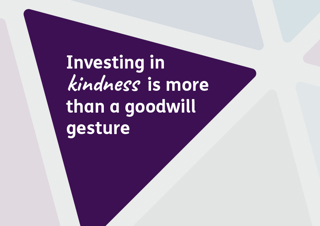
A separate report focusing on the banking sector by the Global Alliance for Banking on Values (GABV, 2016) found that, compared to Global Systemically Important Financial Institutions (GSIFIs), sustainability-focused banks exhibited stable Returns on Assets and showed resilience with reduced volatility over a decade. While GSIFIs historically yielded superior Returns on Equity, sustainability-focused banks excelled after the global financial crisis, maintaining decreased volatility. The elevated returns of GSIFIs are attributed to increased leverage, suggesting greater associated risks.
Kindness in economics extends beyond mere goodwill gestures. It fosters positive organisational cultures, draws in and retains talent, and enhances productivity and financial performance. As businesses evolve towards purpose and responsibility, the significance of kindness as a benchmark for success is amplified. Organisations centred around ESG principles exemplify the harmonious relationship between kindness and economic success, mapping out a blueprint for a compassionate and thriving business future.
It is important to remember that a little kindness goes a long way, and it is not just for business. Being kind not only adds to our own wellbeing but also strengthens social bonds, broadens perspectives, and creates a much happier world.
References
- Chouinard, Y. (2005). Let My People Go Surfing: The Education of a Reluctant Businessman.
- Friede, G., Busch, T., & Bassen, A. (2015). ESG and financial performance: aggregated evidence from more than 2000 empirical studies.
- Friedman, M. (1970) The Social Responsibility of Business is to Increase its Profits
- GABV (2016) Real economy – real returns: a continuing business case for sustainability-focused banking.
- Layard, R. and Ward, G. (2021). Can We be Happier?: Evidence and Ethics.
- Schoenmaker, D. and Schramade, W. (2019) Principles of Sustainable Finance
- Yunus, M. (2007). Creating a World Without Poverty: Social Business and the Future of Capitalism.
About the author
Dr Saite Lu, Mead Fellow and Director of Studies in Economics at Emmanuel College, Cambridge is an Oxbridge trained economist with expertise in international development and public policy. He has extensive teaching, research and publication experience and is a macro-fiscal adviser to the Governments of Ethiopia, South Sudan and Sierra Leone.
Meet our expert

Ellen Fraser
Ellen Fraser leads Baringa’s global Energy Retail, Networks and Water practice and has the responsibility for Baringa’s portfolios in the UK, Europe and Australia. She’s sat in boardrooms with the CEOs of every major UK energy supplier, and even informed policy with energy regulator Ofgem. She’s a familiar face commenting on the BBC, and quoted everywhere from the Financial Times to The Guardian.
Learn moreRelated Insights
Trending content in this series
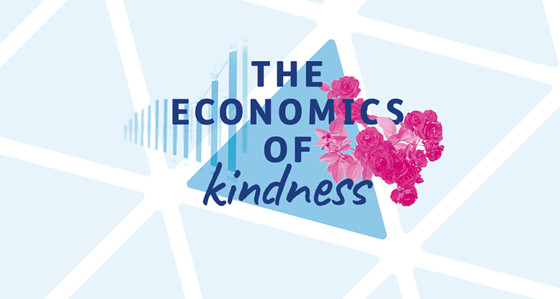
Introducing the Economics of Kindness
At Baringa we’re convinced that, no matter the macroeconomic backdrop, kindness in business really does pay. That’s why we’re taking this opportunity to explore the economics of kindness across four pillars: people, business, leadership and investors.
Read more
People – planet – profit, in that order
The notion of a ‘triple’ bottom line – people first, then planet, then profit – is reshaping how organisations around the world do business. They’re bringing corporate kindness to the fore as we enter a new type of economy, and the businesses that organise themselves in this way will be the ones that succeed.
Read more
Redefining kindness in the workplace
Corporate kindness is all about the impact an organisation has on the world, engaging in responsible practices that benefit their customers, employees, and the communities they operate in.
Read more
Bringing kindness back to the top of the leadership agenda
Should kindness be back at the top of the leadership agenda? Managing Partner Adrian Bettridge discusses how when we lead with kindness, we generate lasting success for ourselves, our clients and our businesses.
Read more
It’s not easy to be a kind leader
Can leaders be kind all of the time? What gets in the way? Ian Peters reflects on the challenges and trade-offs of trying to be kind to all stakeholders.
Read more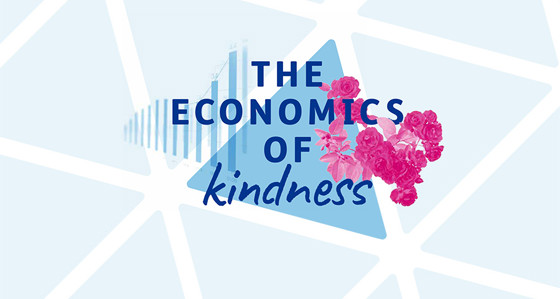
Our Economics of Kindness journey: the story so far
What have we learned about kindness in business and in our public organisations? Does it pay? And if so, how?
Read more